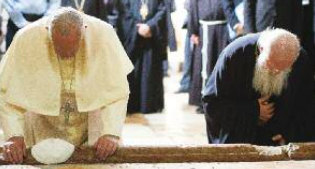_-_vatican_city_-_13_may_2011-n.jpg)
Four Men who Have Obeyed Another
The meeting at the Saint Peter Gardens in Rome was not a diplomatic one, yet it has the strength of a radical gesture, in which are found the Pope’s nature and our need.They represent the Israeli and Palestinian States, and the Roman and Eastern Churches. The ground for this encounter is a garden with St. Peter’s Cupola in the background. The city is Rome. It is a nearly summer evening, bathed in the light of sunset. The man in white, who invited them all to his home, was the first among the successors of Peter to take the name of Francis, the pauper from Assisi.
The encounter with Shimon Peres, Abu Mazen and Bartholomew I, Patriarch of Constantinople, should have taken place during the Pope’s visit to the Holy Land. That attempt failed because it was not possible to find a place for the meeting in the martyrized and divided Middle East. So Pope Francis, as he recounts while on the return plane trip, proposed on the spur of the moment, to meet at his place, on the banks of the Tiber. Finally, the moment of the historic encounter has arrived.
The words of the Koran and the sweet, deep notes of the klezmér music, the Psalms and the Gospel resounded at the prayer meeting. It was a simple gathering where all of the illustrious participants traveled together in an ordinary van from Casa Santa Marta, the Pope’s residence, through the Vatican City, to the gardens behind the imposing Saint Peter’s Basilica, where the ceremony took place.
The encounter took place in three parts, followed by a conclusion. Prayers and music, then the official addresses. Pope Francis underscored that, “Peacemaking calls for courage, much more so than warfare. It calls for the courage to say yes to encounter and no to conflict: yes to dialogue and no to violence; yes to negotiations and no to hostilities; yes to respect for agreements and no to acts of provocation; yes to sincerity and no to duplicity. All of this takes courage; it takes strength and tenacity. History teaches that our own powers do not suffice. More than once we have been on the verge of peace, but the evil one, employing a variety of means, has succeeded in blocking it. That is why we are here, because we know and we believe that we need the help of God. We do not renounce our responsibilities, but we do call upon God in an act of supreme responsibility before our consciences and before our peoples. We have heard a summons, and we must respond. It is the summons to break the spiral of hatred and violence, and to break it by one word alone: the word “brother”. But to be able to utter this word we have to lift our eyes to heaven and acknowledge one another as children of one Father.” 
AN END TO THE CRIES. The Israeli President, Shimon Peres, said, among other things: “Two peoples–Israelis and Palestinians–still are aching for peace. The tears of mothers over their children are still etched in our hearts. We must put an end to the cries, to the violence, to the conflict. We all need peace. Peace between equals. Your invitation to us to join you in this momentous ceremony to call for peace, here in the Vatican garden, in the presence of Jewish, Christian, Muslim, and Druze leaders, graciously reflects your vision of the aspiration we all share: Peace. On this moving occasion, brimming with hope and full of faith, let us all raise with you, Your Holiness, a call for peace between religions, between nations, between communities, and between fellow men and women. Let true peace become our legacy soon and swiftly.”
And at the end, Abu Mazen said: “We ask You, O Lord, for peace in the Holy Land, Palestine, and Jerusalem together with its people. We call on you to make Palestine and Jerusalem in particular a secure land for all believers, and a place for prayer and worship for the followers of the three monotheistic religions Judaism, Christianity, Islam, and for all those wishing to visit it as it is stated in the Holy Quran. O Lord, You are the peace and peace emanates from You. O God of Glory and Majesty grant us security and safety, and alleviate the suffering of my people in hometown and Diaspora.”
It was neither a political meeting, nor a diplomatic dialogue, yet what political and diplomatic consequences from a simple and radical gesture of prayer! All of the Pope’s nature can be found in the essentiality of his initiative. Their last act was the planting of an olive tree. The four men each took a shovel and worked the earth; with humility, obeying Another. The earth abounds in gratitude.